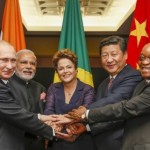Uncertainty prevails over the direction BRICS (Brazil, Russia, India, China, and South Africa) are taking today. Some experts have announced “the end of the BRICS era” and talked about “Falling BRICS”. BRICS governments are, however, proceeding full steam ahead with an elaborate programme to strengthen the grouping. A valid question, therefore, is whether BRICS is on the trajectory of decline, consolidation or rise?
There is little doubt since the summit in Ufa (Russia) last year that plenty of bad news has emerged. Brazil’s president, Dilma Rousseff, faces impeachment: the parliament’s lower house voted 367 to 137 to move ahead with the impeachment process. If the senate were to support this with a simple majority, Rousseff would have to step aside temporarily, making way for a replacement.
South Africa’s president, Jacob Zuma, escaped impeachment recently as his party, the ANC, stood behind him to defeat an opposition motion in parliament. Many in the party, and many more in the nation have serious misgivings about Zuma’s leadership: he is widely viewed as a lame duck.
Developments on the economic front have particularly been disturbing: Brazil’s economy is shrinking; the South African economy is stagnant. Russia, hit hard by a sharp fall in oil prices, sees its economic woes grow by the day. In 2016–17, Brazil and Russia are expected to show negative growth: -3.6% and -1.5 %, respectively, while South Africa may turn in 0.7% growth.
A slowdown in the Chinese economy is a cause for worry not only for China but the entire world. India, with its 7.5% growth, is seen as “the bright spot”, but a controversial remark by Raghuram Rajan, Reserve Bank of India governor, comparing the Indian economy to a “one-eyed king in a land of the blind”, has pointed to its vulnerabilities.
Another factor triggering questions about the future of BRICS is the delicate state of its most important bilateral relationship, i.e., between India and China. Both competition and cooperation define its broad contours, but, of late, there are divergences on a number of subjects: terrorism, border issues, China’s South Asia policy, the South China Sea, India’s growing proximity to the United States and Japan, “One Belt, One Road”, the China-Pakistan Economic Corridor, and the Bangladesh–China–India–Myanmar Forum for Regional Cooperation (BCIM). Yet, the two nations are acutely conscious of the need to cooperate on other political and economic questions, particularly China’s gradually increasing engagement with development projects in India.
It is also important to factor in what is happening on the other side of the hill:
As junior BRICS members, Brazil and South Africa are preoccupied with their internal challenges, the burden of leadership falls on the major players—Russia, India, and China. Russia led BRICS with a firm hand, delivering an excellent summit last year, and India plans to do even better. China, too, remains fully committed to BRICS— it cannot do without it— with the BRICS’ flagship New Development Bank (NDB) headquartered in Shanghai.
Consequently, it is the old RIC (Russia, India, and China) that may guide and shape the destiny of the new BRICS: Russian and Chinese foreign ministers have recently expressed full support for India’s presidency of BRICS.
The Big Three need BRICS for economic and compelling strategic reasons: Russia and China view it as a mechanism to counter the West; for India, BRICS is a grouping that balances its pro-West tendencies, giving it a finely calibrated standing in global affairs.
With India as the chair this year, the thinking and plans of the Modi government are of great relevance. Prime Minister Modi’s maiden appearance on the international stage was at the BRICS Summit at Fortaleza (Brazil) in July 2014. He spoke of “the uniqueness of BRICS as an international institution”, and depicted “the idea of BRICS” as “forward-looking”. Later, he gave a new elaboration of BRICS: “Building Responsive, Inclusive and Collective Solutions”.
All the signs of a pro-active presidency are present. A senior official told this author that about 40 meetings and events are scheduled to unfold during India’s 11-month long tenure as chair, to broaden and deepen the group’s internal solidarity and cooperation. Also noteworthy is that, firstly, many of the activities proposed would focus on strengthening people-to-people relations, and secondly, most of the events appear to be directly linked to the Modi government’s core agenda for India.
Clearly, BRICS are now prepared to deliver on ambitious announcements made earlier. The association could consider an out-of-box option such as expanding its membership base in order to rejuvenate it further.
The financial heft of BRICS will now be demonstrated through the development loans NDB is beginning to extend. K.V. Kamath, Indian president of the bank, views it as an “assertion of political sovereignty by BRICS”. The bank recently announced the first set of loans, amounting to $811 million but entirely for renewable energy in four member countries. –Russia and others may be covered through the next set of loans: indications are that NDB will pump in $2 billion in 2016. A logical conclusion, therefore, is that although the BRICS caravan is passing through difficult times, its major leaders appear determined to continue their journey as in the/their collective interest. Indeed, the world is likely to hear more, and not less, about BRICS in the foreseeable future.
Rajiv Bhatia is Distinguished Fellow, Foreign Policy Studies Programme, Gateway House, a former high commissioner to South Africa, and a regular commentator on international affairs.
This article was exclusively written for Gateway House: Indian Council on Global Relations. You can read more exclusive content here.
For interview requests with the author, or for permission to republish, please contact outreach@gatewayhouse.in.
© Copyright 2016 Gateway House: Indian Council on Global Relations. All rights reserved. Any unauthorized copying or reproduction is strictly prohibited.


